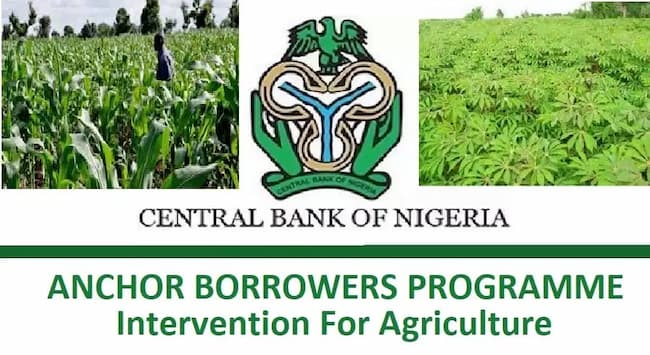The Central Bank of Nigeria (CBN) has called beneficiaries of the Anchor Borrowers’ Programme (ABP) to repay their loans.
According to the CBN’s 2020 fourth-quarter economic report, only ₦118 billion has been repaid of the ₦497 billion disbursed to 2.5 million farmers.
Reasons for the repayment issue can be traced to incessant bandit attacks on farmers in the Northern region, farmer-herders crises in the Southern region, climate change, and natural disasters like flooding.
Anchor Borrowers’ Programme
The Anchor Borrowers’ Programme (ABP) is the flagship agricultural intervention scheme by the Central Bank of Nigeria (CBN). It was launched in 2015, in line with CBN’s developmental function.
ABP establishes a link between anchor companies (processing companies) and smallholder farmers (SHFs) of some key agricultural products like rice, maize, wheat, cotton, cassava, cocoa, rubber, and livestock (fish, poultry, ruminants). Beneficiaries are in groups of five to 20 people for ease of administration.
ABP is aimed at reducing agricultural commodity importation, increasing banks’ financing of the agricultural sector, and creating a new generation of farmers, among other things. In a broader perspective, it’d be right to say the programme is aimed at gradually diversifying the national economy.
READ ALSO: Anchor Borrowers’ Programme Has Supported 2.9 million Farmers – Emefiele
BizWatch Nigeria recalls that the CBN Governor, Godwin Emefiele, on March 2021, disclosed that 2.9 million farmers have cultivated 3.6 million hectares across 21 commodities under ABP.
3,107, 949 farmers have cultivated 3.8 million hectares of land. Other positive impacts credited to the programme include a boost in the local production of rice, saving the country about $800 million in foreign exchange; the unveiling of 13 rice pyramids which housed 200 thousand bags of rice (50 kg each) in Kebbi and Gombe state, and a rice pyramid in Ekiti state.
Loan
Farmers often repay loans from sales made from harvested produce. But when productivity is affected, payment becomes an issue. And this will consequently hamper the sustainability of the programme.
In a bid to encourage the participation of PFI’s (participating financial institutions like Non-Interest Microfinance bank and Development Finance Institutions) in the programme, the CBN bear 50 percent of the cost, if a farmer defaults in payment.
